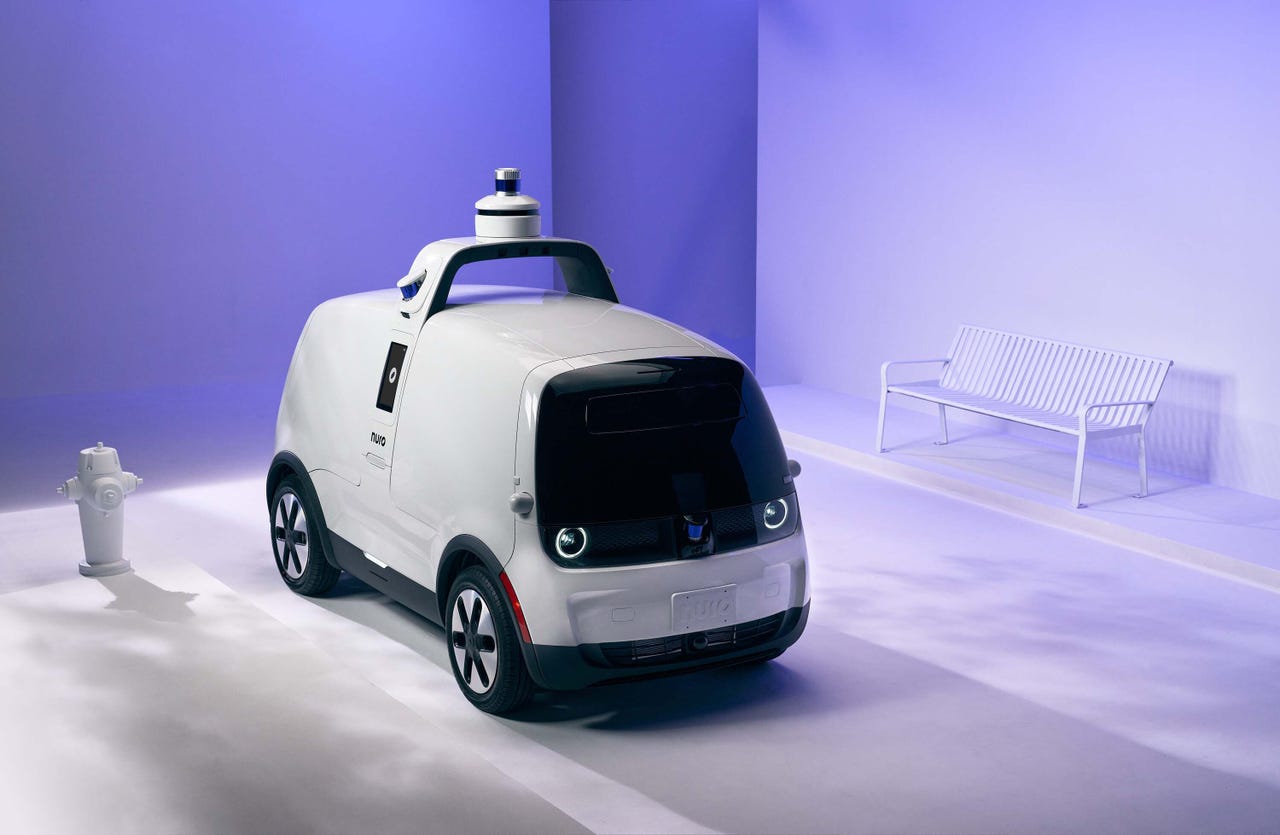New Nuro robot? Think Storm Trooper meets Tayo the Bus


The delivery robot wars continue to heat up as the pandemic roils on under a fresh wave of cases. For technology developers, that means a new generation of robotic platforms built to capitalize on the growing recognition among major brands that autonomous delivery can increase efficiency and scale as more people dine at home more often.
Nuro, a relative newcomer but already a leader in the space, just unveiled its third-generation zero-occupant autonomous delivery vehicle. Designed with delivery in mind, the new Nuro can carry more goods and enable more deliveries, with twice the cargo volume of the company's current vehicle. The automotive production-grade vehicle will also feature modular inserts to customize storage and new temperature-controlled compartments to keep goods warm or cool and safety enhancements to further improve safety for pedestrians outside the vehicle.
It's also pretty cute. If you have young kids, you might be familiar with the cartoon Tayo the Little Bus. Mix in a little Storm Trooper attitude, et voila, the new Nuro!
Overall, the market for autonomous mobile robots (AMRs) and autonomous ground vehicles (AGVs) is forecasted to generate over $10bn by 2023, according to Interact Analysis, and that prediction relies on data from before the COVID-19 pandemic. Delivery robots, in particular, are quickly coming of age as COVID-19 lingers and touchless fulfillment becomes the norm. Sidestepping municipal red tape, enterprising companies like Nuro and Starship Technologies have launched pilot programs in controlled access spaces, such as college campuses.
Nuro's announcement follows a $600 million Series D funding round closed in Q4 2021 and the AV leader's long list of strategic partnerships with notable quick service and convenience brands. Notably, Nuro also formalized a commitment to leveraging the company's third-generation vehicle with a long-standing partner and investor Kroger.
"Five years ago, we set out to build an autonomous vehicle and delivery service designed to run errands, giving people back valuable time. Through our strategic partnerships with Domino's, FedEx, Kroger, 7-Eleven and more, we are doing just that -- improving road safety, sustainability and overall access to goods delivery," said Dave Ferguson, Nuro co-founder and president. "With the introduction of our new flagship model and the ground-breaking of our new production facility-- one of the industry's first end-of-line manufacturing facilities in America -- we are excited about the opportunity to fulfill our vision of improving everyday life through autonomous delivery at scale."
The new model will be produced in a supplier partnership with BYD North America and completed at Nuro's new $40 million end-of-line manufacturing facility and world-class closed-course test track in southern Nevada. The facilities have the capacity to manufacture and test tens of thousands of delivery vehicles per year to ensure they are ready for deployment. BYD North America -- part of one of the largest OEM networks of electric vehicles in the world -- will assemble globally sourced hardware components for the vehicle platforms; Nuro will complete the final steps of manufacturing and make the autonomous vehicles ready for deployment.
"BYD attaches great importance to this collaboration with Nuro. As one of the world's leading electric vehicle manufacturers and a turnkey solution provider, BYD will leverage the manufacturing capacity of its Lancaster facility to support Nuro and bring more jobs to California," said Stella Li, Executive Vice President of BYD Co. Ltd. and President of BYD Motors Inc. "We are confident the development of this transformative autonomous delivery vehicle will create a better environment for us all."
There's an interesting onshoring story happening around the automation sector -- which is somewhat ironic given the association of robots with human layoffs. Nuro's southern Nevada facilities are expected to be fully operational this year and will allow the company to manufacture its autonomous vehicles that are made in the USA. The facilities will create an initial 250 highly skilled career opportunities with long-term growth potential in the autonomous vehicle industry. Construction on the manufacturing facility officially kicked off in November 2021.
As American robotics developers look to make a case to local governments to let robots loose on city streets, where they will end up right at customer's doorsteps, there's every incentive to keep the technology, from development to manufacturing, onshore. Lingering supply chain issues have only emphasized this point.